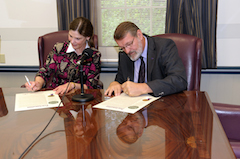May 12, 2014
Proclamations signed in honor of 100th anniversary of Cooperative Extension Service

It's a salute to the faculty, staff and volunteers who have contributed careers, passions and their time to a common belief of a better future for Kansas.
In that recognition, Kansas State University recognized the 100th anniversary of the Cooperative Extension Service and the signing of the Smith-Lever Act, which took place May 8, 1914.
The development of the Cooperative Extension Service enables the university, through K-State Research and Extension, to enrich the lives of Kansans. Extension focuses its work on finding solutions for topics important to Kansans, using its statewide network to share information.
On Thursday, May 8, April Mason, K-State provost and senior vice president, and Daryl Buchholz, associate director for extension and applied research, signed a proclamation recognizing the Cooperative Extension Service as a crucial component of the land-grant mission.
"How insightful our forbearers were to decide that our land-grant universities should be reaching out to communities, working with individuals within our counties and states, to make their lives better with the knowledge that comes from our universities," Mason said.
Buchholz added that the 100th anniversary provides an opportunity not only to recognize the work of the Cooperative Extension Service in the past, but to look forward and continue to focus on its fundamental purpose: to create a better people.
Creating a better people was the foundation of extension from the beginning, Buchholz said, as Seaman Knapp, a respected educator at the turn of the 20th century and the man commonly called the "father of extension," determined such as the purpose.
"That foundation has not changed in 100 years," Buchholz said. "Often we have individuals from across the world who marvel at cooperative extension in the United States. Many times they come to Kansas State University to learn about how we accomplish the mission of extension — engaging with people and helping them make improvements in life."
The signed proclamations honor cooperative extension, which engages with rural and urban learners through practical community-based and online approaches. This results in knowledge, skills and motivation to address the grand challenges facing Kansans in global food systems, water, health, vitalizing communities and developing tomorrow's leaders.
Extension works collaboratively with research, particularly the Agricultural Experiment Station system and with academic programs in the system. There are 106 land-grant colleges and universities serving all 50 states, the District of Columbia and six U.S. territories.
Nationally, celebrations for the 100th anniversary of the Cooperative Extension System took place May 8. Kansas Gov. Sam Brownback signed a proclamation honoring Cooperative Extension on May 1.
